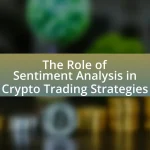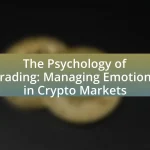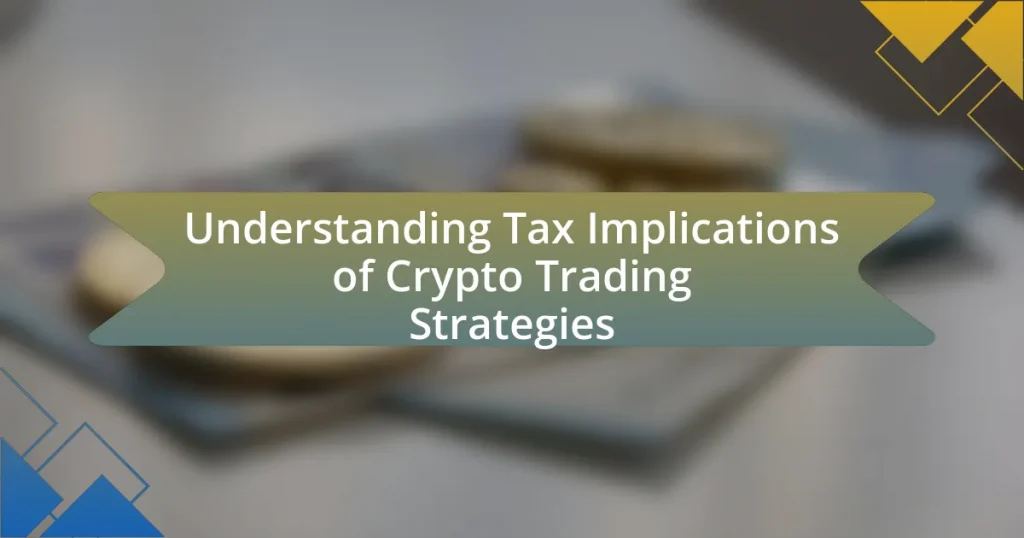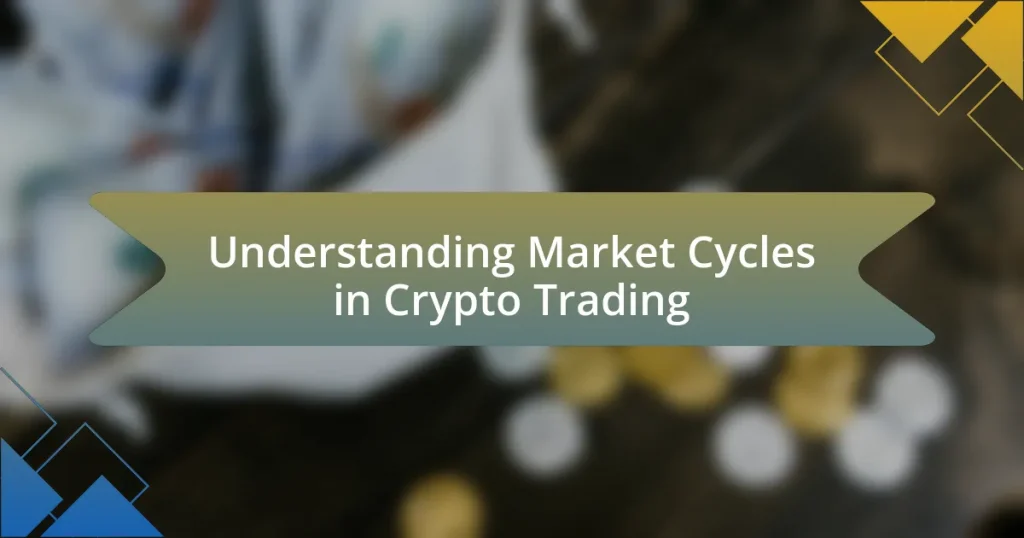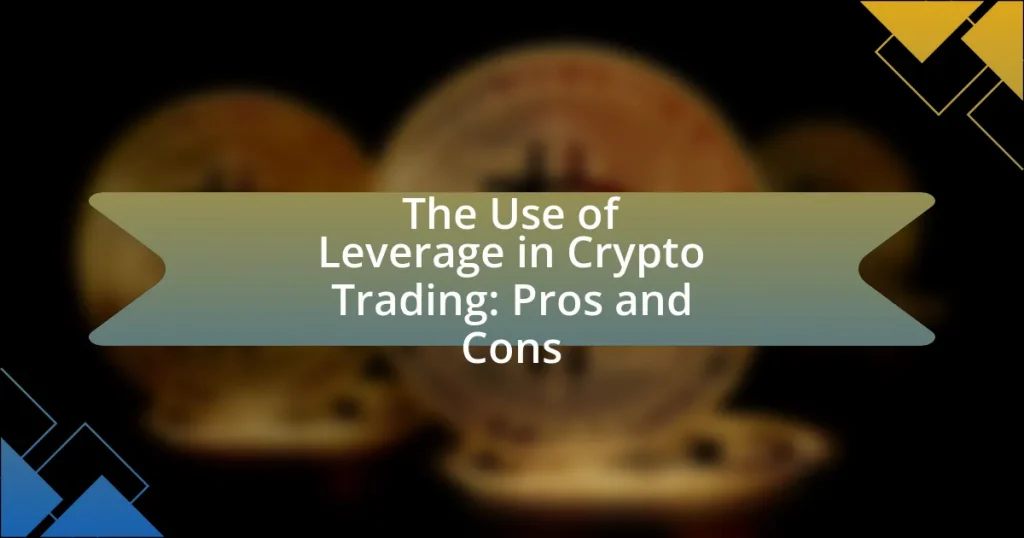The article focuses on the psychology of trading in crypto markets, emphasizing the emotional and cognitive factors that influence traders’ decisions. It explores how emotions such as fear, greed, and anxiety can lead to irrational behaviors, impacting trading outcomes through cognitive biases like confirmation bias and loss aversion. Key topics include the influence of emotions on trading decisions, the importance of emotional awareness and psychological resilience, and strategies for managing stress and improving trading discipline. The article highlights the significance of understanding trading psychology for enhancing performance and making informed decisions in the volatile crypto environment.

What is the Psychology of Trading in Crypto Markets?
The psychology of trading in crypto markets involves understanding the emotional and cognitive factors that influence traders’ decisions. Traders often experience fear, greed, and anxiety, which can lead to irrational behaviors such as panic selling or overtrading. Research indicates that cognitive biases, such as confirmation bias and loss aversion, significantly impact trading outcomes. For instance, a study published in the Journal of Behavioral Finance found that traders who are overly optimistic about their investments tend to ignore negative information, leading to poor decision-making. Understanding these psychological elements is crucial for developing effective trading strategies and managing risk in the volatile crypto environment.
How do emotions influence trading decisions in crypto markets?
Emotions significantly influence trading decisions in crypto markets by affecting traders’ risk tolerance and decision-making processes. For instance, fear can lead to panic selling during market downturns, while greed may drive traders to hold onto assets longer than advisable, hoping for higher returns. Research indicates that emotional responses can result in cognitive biases, such as overconfidence or loss aversion, which distort rational analysis. A study by the University of California found that emotional trading can lead to a 20% decrease in profitability compared to more rational approaches. This evidence underscores the critical role emotions play in shaping trading behaviors and outcomes in the volatile crypto environment.
What are the common emotional responses traders experience?
Traders commonly experience emotional responses such as fear, greed, anxiety, and euphoria. Fear often arises from the potential of losing money, leading to hesitation in making trades. Greed can drive traders to take excessive risks in pursuit of higher profits, often resulting in poor decision-making. Anxiety frequently occurs during volatile market conditions, causing stress and impacting judgment. Euphoria may follow significant gains, leading to overconfidence and reckless trading behavior. These emotional responses are well-documented in trading psychology literature, highlighting their impact on decision-making and overall trading performance.
How do fear and greed manifest in trading behavior?
Fear and greed manifest in trading behavior through emotional responses that influence decision-making. Fear often leads traders to sell assets prematurely to avoid losses, resulting in missed opportunities for recovery. For instance, during market downturns, fear can trigger panic selling, causing prices to drop further. Conversely, greed drives traders to hold onto assets longer than advisable, hoping for higher returns, which can lead to overexposure and significant losses when the market corrects. Research by the Behavioral Finance Association indicates that emotional biases, such as fear and greed, significantly impact trading outcomes, with studies showing that traders influenced by these emotions often underperform compared to those who maintain a disciplined approach.
Why is understanding trading psychology important for crypto traders?
Understanding trading psychology is crucial for crypto traders because it directly influences their decision-making processes and overall trading performance. Emotional factors such as fear, greed, and overconfidence can lead to irrational trading behaviors, resulting in significant financial losses. Research indicates that traders who are aware of their psychological biases are better equipped to manage their emotions, leading to more disciplined trading strategies. For instance, a study published in the Journal of Behavioral Finance found that emotional regulation can enhance trading outcomes by reducing impulsive decisions. Therefore, grasping trading psychology enables crypto traders to navigate market volatility more effectively and make informed choices.
How can emotional awareness improve trading performance?
Emotional awareness can significantly improve trading performance by enabling traders to recognize and manage their emotional responses to market fluctuations. When traders are aware of their emotions, they can make more rational decisions, reducing the likelihood of impulsive actions driven by fear or greed. Research indicates that emotional regulation is linked to better decision-making in high-stakes environments, such as trading. For instance, a study published in the Journal of Behavioral Finance found that traders who practiced emotional awareness experienced fewer losses and made more consistent profits compared to those who did not. This demonstrates that emotional awareness not only enhances self-control but also contributes to a more disciplined trading strategy, ultimately leading to improved performance in the volatile crypto markets.
What role does psychological resilience play in trading success?
Psychological resilience is crucial for trading success as it enables traders to effectively manage stress, recover from losses, and maintain a disciplined approach. Resilient traders are better equipped to handle the emotional volatility inherent in trading, which can lead to more rational decision-making and reduced impulsivity. Research indicates that traders with high psychological resilience are more likely to stick to their trading plans and strategies, even in the face of market fluctuations. For instance, a study published in the Journal of Behavioral Finance found that emotional regulation, a component of resilience, significantly correlates with trading performance, highlighting the importance of psychological factors in achieving consistent success in trading.

What are the key psychological challenges faced by crypto traders?
Crypto traders face several key psychological challenges, including fear of missing out (FOMO), loss aversion, and emotional decision-making. FOMO drives traders to make impulsive decisions based on market trends, often leading to poor investment choices. Loss aversion causes traders to hold onto losing positions longer than advisable, as they fear realizing a loss, which can exacerbate financial setbacks. Emotional decision-making, influenced by market volatility, can lead to irrational trading behaviors, such as overtrading or panic selling. Research indicates that these psychological factors significantly impact trading performance, with studies showing that emotional biases can lead to suboptimal investment outcomes.
How does market volatility affect trader psychology?
Market volatility significantly impacts trader psychology by inducing heightened emotions such as fear and greed. When markets experience rapid price fluctuations, traders often react impulsively, leading to poor decision-making. For instance, a study published in the Journal of Behavioral Finance found that increased volatility correlates with a rise in emotional trading, where traders are more likely to buy high and sell low due to panic or euphoria. This emotional response can result in increased stress levels and a decrease in rational analysis, ultimately affecting trading performance and strategy.
What psychological effects arise from rapid price fluctuations?
Rapid price fluctuations can lead to heightened anxiety and emotional distress among traders. This psychological response is often characterized by fear of loss, leading to impulsive decision-making and increased stress levels. Research indicates that such volatility can trigger a phenomenon known as “loss aversion,” where individuals disproportionately weigh potential losses more heavily than equivalent gains, resulting in irrational trading behaviors. A study published in the Journal of Behavioral Finance by J. Edward Russo and Paul J.H. Schoemaker highlights that traders experiencing rapid price changes often exhibit overconfidence, which can exacerbate poor investment choices.
How can traders manage stress during market downturns?
Traders can manage stress during market downturns by implementing structured risk management strategies, maintaining a disciplined trading routine, and practicing mindfulness techniques. Structured risk management, such as setting stop-loss orders and diversifying portfolios, helps mitigate potential losses and reduces anxiety about financial exposure. A disciplined trading routine, which includes regular analysis and adherence to a trading plan, fosters a sense of control and predictability, alleviating stress. Mindfulness techniques, such as meditation and deep-breathing exercises, have been shown to lower stress levels and improve emotional regulation, allowing traders to remain focused and make rational decisions during volatile market conditions.
What cognitive biases impact trading decisions?
Cognitive biases significantly impact trading decisions by distorting rational judgment and leading to suboptimal choices. Common biases include overconfidence, where traders overestimate their knowledge and predictive abilities, often resulting in excessive risk-taking. Loss aversion causes traders to fear losses more than they value gains, leading to holding losing positions too long. Anchoring bias occurs when traders fixate on specific price points, affecting their decision-making. Confirmation bias leads traders to seek information that supports their existing beliefs while ignoring contradictory evidence. Research by Barber and Odean (2001) in “Boys Will Be Boys: Gender, Overconfidence, and Common Stock Investment” demonstrates that overconfidence can lead to excessive trading and lower returns. These biases collectively hinder effective trading strategies and can exacerbate emotional responses in volatile markets like cryptocurrencies.
How does confirmation bias influence trading strategies?
Confirmation bias significantly influences trading strategies by causing traders to favor information that supports their existing beliefs while disregarding contradictory data. This cognitive bias leads traders to selectively seek out news, analysis, and market signals that align with their preconceived notions about a cryptocurrency’s potential, which can result in poor decision-making. For instance, a study published in the Journal of Behavioral Finance found that traders exhibiting confirmation bias were more likely to hold losing positions longer, as they focused on optimistic forecasts rather than acknowledging negative trends. This behavior can exacerbate losses and hinder the ability to adapt strategies based on comprehensive market analysis.
What is the impact of overconfidence on trading outcomes?
Overconfidence negatively impacts trading outcomes by leading to excessive risk-taking and poor decision-making. Traders exhibiting overconfidence often overestimate their knowledge and abilities, resulting in increased trading frequency and larger positions than warranted by market conditions. Research indicates that overconfident traders tend to ignore critical information and fail to adequately assess risks, which can lead to significant financial losses. For instance, a study published in the Journal of Finance by Barber and Odean (2001) found that overconfident investors traded 45% more than their less confident counterparts, ultimately resulting in lower returns. This demonstrates that overconfidence can distort judgment and adversely affect trading performance.

How can traders effectively manage their emotions in crypto markets?
Traders can effectively manage their emotions in crypto markets by implementing structured trading plans and practicing mindfulness techniques. A structured trading plan includes clear entry and exit strategies, risk management rules, and predefined emotional responses to market fluctuations, which helps reduce impulsive decisions driven by fear or greed. Mindfulness techniques, such as meditation and deep-breathing exercises, can enhance emotional awareness and control, allowing traders to remain calm during volatile market conditions. Research indicates that emotional regulation strategies can significantly improve trading performance, as traders who maintain emotional stability are less likely to make irrational decisions that lead to losses.
What strategies can help traders control their emotions?
Traders can control their emotions by implementing strategies such as setting clear trading plans, practicing mindfulness, and utilizing risk management techniques. Establishing a trading plan helps traders define entry and exit points, which reduces impulsive decisions driven by emotions. Mindfulness practices, such as meditation, can enhance emotional awareness and help traders remain calm during market fluctuations. Additionally, employing risk management techniques, like setting stop-loss orders, allows traders to limit potential losses, thereby reducing anxiety and emotional stress associated with trading. These strategies are supported by research indicating that structured approaches and emotional regulation techniques can significantly improve trading performance and decision-making.
How can mindfulness techniques improve trading discipline?
Mindfulness techniques can significantly improve trading discipline by enhancing emotional regulation and decision-making clarity. Practicing mindfulness helps traders become more aware of their thoughts and feelings, allowing them to recognize impulsive reactions to market fluctuations. Research indicates that mindfulness can reduce stress and anxiety, which are common emotional barriers in trading. A study published in the Journal of Behavioral Finance found that traders who engaged in mindfulness practices demonstrated better risk management and adherence to their trading plans. This improved focus and self-awareness lead to more disciplined trading behaviors, ultimately resulting in better performance in volatile markets like cryptocurrencies.
What role does journaling play in emotional management?
Journaling plays a crucial role in emotional management by providing a structured outlet for individuals to express and process their feelings. This practice allows traders to reflect on their emotional responses to market fluctuations, identify patterns in their behavior, and develop strategies to cope with stress and anxiety. Research indicates that expressive writing can lead to improved emotional regulation and reduced psychological distress, as evidenced by a study published in the Journal of Clinical Psychology, which found that participants who engaged in regular journaling reported lower levels of anxiety and depression. By documenting their thoughts and emotions, traders can gain insights into their decision-making processes, ultimately enhancing their ability to manage emotions effectively in the volatile crypto markets.
What are the best practices for maintaining a healthy trading mindset?
To maintain a healthy trading mindset, traders should implement practices such as setting clear goals, managing risk effectively, and maintaining emotional discipline. Setting clear goals helps traders define their objectives and stay focused, which is crucial in the volatile crypto markets. Effective risk management, including the use of stop-loss orders and position sizing, minimizes potential losses and protects capital. Emotional discipline involves recognizing and controlling emotions like fear and greed, which can lead to impulsive decisions. Research indicates that traders who adhere to these practices are more likely to achieve consistent performance and avoid detrimental trading behaviors.
How can setting realistic goals enhance emotional stability?
Setting realistic goals enhances emotional stability by providing clear, achievable benchmarks that reduce anxiety and frustration. When individuals set attainable objectives, they experience a sense of accomplishment, which fosters positive emotions and reinforces self-efficacy. Research indicates that goal-setting theory, developed by Edwin Locke and Gary Latham, shows that specific and challenging goals lead to higher performance compared to vague or easy goals. This structured approach helps traders in crypto markets manage their emotions effectively, as they can track progress and adjust strategies based on realistic expectations, thereby minimizing the emotional turmoil often associated with market volatility.
What techniques can traders use to develop emotional intelligence?
Traders can develop emotional intelligence by practicing self-awareness, mindfulness, and reflective journaling. Self-awareness allows traders to recognize their emotional triggers and responses during trading, which is essential for managing stress and making rational decisions. Mindfulness techniques, such as meditation and breathing exercises, help traders stay present and reduce anxiety, enabling them to respond to market changes calmly. Reflective journaling encourages traders to analyze their emotional experiences and decision-making processes, fostering a deeper understanding of their psychological patterns. Research indicates that these techniques can enhance emotional regulation and improve trading performance, as evidenced by studies showing that emotionally intelligent traders tend to make more informed and less impulsive decisions.
What practical tips can traders implement to manage emotions effectively?
Traders can manage emotions effectively by implementing structured strategies such as setting clear trading plans, utilizing stop-loss orders, and practicing mindfulness techniques. Establishing a trading plan helps traders define entry and exit points, reducing impulsive decisions driven by emotions. Using stop-loss orders limits potential losses, providing a safety net that can alleviate anxiety during market fluctuations. Mindfulness techniques, such as meditation or deep-breathing exercises, enhance emotional awareness and control, allowing traders to respond to market changes with a calm mindset. Research indicates that emotional regulation is crucial for successful trading, as traders who manage their emotions tend to make more rational decisions, leading to improved performance in volatile markets.



